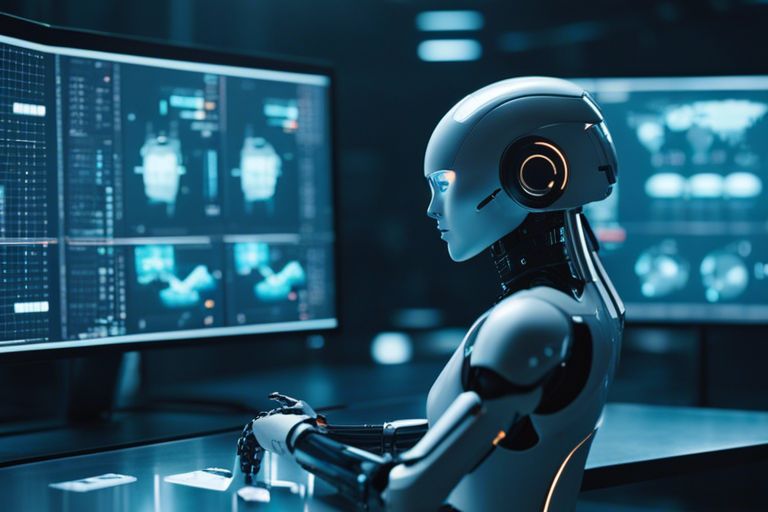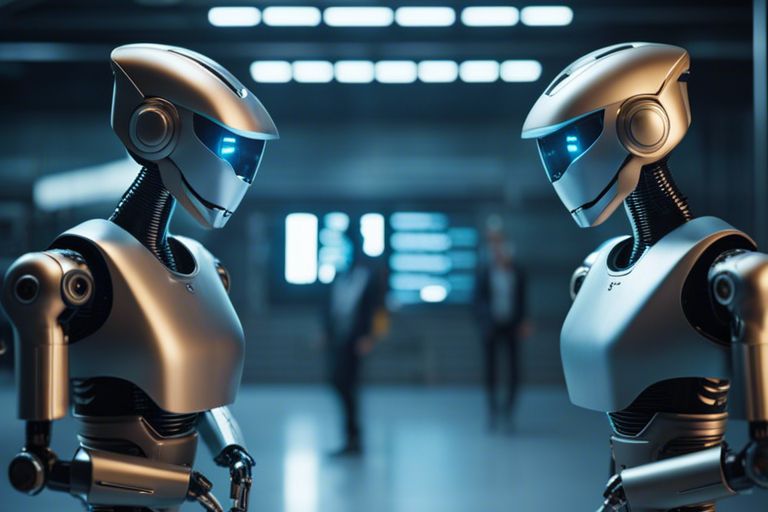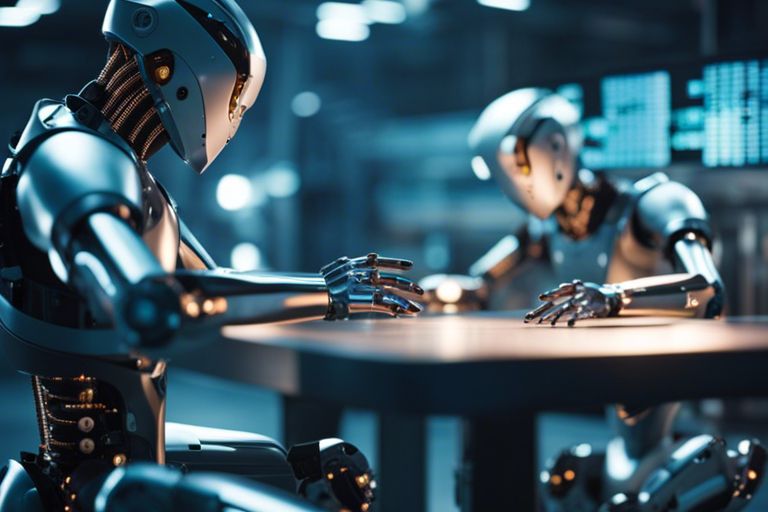There’s no denying that Artificial Intelligence (AI) is revolutionizing the way we live and work. Through the years, AI has continuously pushed boundaries and is now at the forefront of automation technology. AI advancements have enabled machines to simulate human intelligence processes, making significant impacts on various industries such as healthcare, manufacturing, finance, and more. However, as the capabilities of AI continue to grow, so do concerns regarding its ethical implications and potential dangers. In this blog post, we will explore the recent advancements in AI and discuss how this evolution is shaping the future of automation technology.
Key Takeaways:
- Increased Efficiency: AI advancements have led to significant improvements in automation technology, allowing businesses to streamline processes and increase overall efficiency.
- Enhanced Decision-Making: AI tools are now equipped with advanced machine learning algorithms that can analyze vast amounts of data to provide valuable insights for better decision-making.
- Improved Customer Experience: Automation technology powered by AI has transformed customer service, providing personalized experiences and quicker response times, ultimately enhancing customer satisfaction.
Historical Perspective
You are about to commence on a journey through the fascinating evolution of automation technology and artificial intelligence (AI). By delving into the historical perspective of this ever-evolving field, you can gain a deeper understanding of how AI has transformed the way we live and work.
Early Stages of AI and Automation
Automation has been a part of human history for centuries, with early inventors and thinkers dreaming of machines that could perform tasks autonomously. However, it wasn’t until the 20th century that significant advancements in automation technology began to take shape. The invention of the programmable computer in the mid-20th century paved the way for the development of early AI systems, laying the groundwork for the automation technology we see today.
AI and automation technology continued to progress throughout the latter half of the 20th century, with researchers and engineers pushing the boundaries of what machines could accomplish. The creation of expert systems, neural networks, and machine learning algorithms marked significant milestones in the field, setting the stage for the modern era of AI-driven automation.
Milestones in AI Developments
Any discussion of the history of AI would be incomplete without mentioning landmark moments in the field. From IBM’s Deep Blue defeating world chess champion Garry Kasparov to Google’s AlphaGo mastering the ancient game of Go, these achievements have showcased the potential of AI to outperform human intelligence in specific tasks. The development of virtual assistants like Siri and Alexa has also revolutionized the way we interact with technology, bringing AI into our daily lives in ways previously unimaginable.
Historical breakthroughs such as these highlight the positive impact that AI and automation technology can have on society. However, it is important to acknowledge that with great power comes great responsibility. As AI continues to advance, we must be vigilant in addressing dangerous implications such as privacy concerns, job displacement, and ethical considerations.

Current State of AI and Automation
Obviously, the current state of AI and automation technology is rapidly advancing, revolutionizing various industries and reshaping the way we work. With the integration of AI and automation, processes are becoming more efficient, accurate, and cost-effective.
Cutting-Edge AI Technologies
On the frontier of AI technologies, we see advancements such as machine learning, natural language processing, neural networks, and computer vision. These cutting-edge technologies are enabling machines to learn from data, understand human language, recognize patterns, and interpret visual information.
The integration of these AI technologies into various applications is transforming industries like healthcare, finance, manufacturing, and transportation. AI is not only streamlining operations but also enhancing decision-making processes and driving innovation.
Automation in Various Industries
Cutting-edge automation technology is being utilized in various industries, from manufacturing and logistics to healthcare and agriculture. Automation is revolutionizing how tasks are accomplished, with robots and algorithms taking over repetitive and labor-intensive jobs.
Automation in industries like manufacturing has led to increased productivity, reduced errors, and improved safety for workers. The use of automation systems in healthcare has enhanced patient care, diagnosis, and treatment outcomes.
Automation in various industries is paving the way for a more efficient and productive future, but it also raises concerns about potential job displacement and the need for upskilling the workforce to adapt to the changing landscape.

The Impact of AI and Automation
Many industries have witnessed significant changes due to advancements in AI and automation technologies. According to The Evolution of Industrial Automation in 2024, these technologies have revolutionized the way businesses operate, offering increased efficiency, precision, and productivity.
Effects on Employment and Workforce
To address the impact of AI and automation on employment and the workforce, organizations are reevaluating traditional job roles and creating new opportunities. While some repetitive tasks are being automated, new roles are emerging that require human skills such as creativity, critical thinking, and problem-solving. There is a growing need for upskilling and reskilling to adapt to the evolving job market driven by automation.
Ethical and Societal Considerations
The integration of AI and automation raises ethical and societal considerations that must be carefully addressed. Concerns encompass issues such as data privacy, algorithm bias, and the potential for job displacement. It is crucial for businesses and policymakers to establish regulations and frameworks that ensure transparency, accountability, and fairness in the development and deployment of AI technologies.
The ethical and societal implications of AI and automation extend to areas such as autonomous vehicles, healthcare, and surveillance. As these technologies become more pervasive, it is vital to engage in ongoing discussions and collaborations to navigate the ethical challenges and seize the opportunities for societal benefit.
Future Prospects and Challenges
Not everyone is aware of the full scope of advancements in automation technology. Automation has come a long way, evolving from traditional Robotic Process Automation (RPA) to intelligent automation (IA). For a deeper understanding of this evolution, check out The Evolution of Process Automation. From RPA to IA …
Predictions for AI Advancements
Challenges lie ahead in AI advancements. As technology continues to progress, the quest for achieving true artificial intelligence remains at the forefront. There is still much work to be done in order to develop AI systems that can truly understand, learn, and adapt to complex situations autonomously. One of the key predictions for AI advancements is the increasing integration of AI with other emerging technologies such as blockchain, Internet of Things (IoT), and quantum computing.
Anticipated Hurdles for AI and Automation
Prospects for AI and automation are promising, but there are several anticipated hurdles that must be overcome. *One of the main challenges in the field of AI is the ethical implications surrounding its use. As AI becomes more advanced and pervasive, concerns about data privacy, job displacement, and bias in algorithms will need to be addressed. Additionally, ensuring the security and trustworthiness of AI systems will be paramount as they play increasingly integral roles in various aspects of society.*
To navigate these challenges successfully, collaboration between policymakers, industry experts, and ethicists will be imperative. By addressing these hurdles head-on, we can pave the way for a future where AI and automation technologies benefit society in a responsible and ethical manner.
Final Thoughts
Summarizing the Evolution of AI and Automation
Thoughts on the evolution of AI and automation technology are impressive. From simple rule-based systems to complex neural networks, the journey of artificial intelligence has been nothing short of extraordinary. The rapid advancements in machine learning algorithms and data processing capabilities have propelled AI to new heights, enabling automation in various sectors like never before.
The integration of AI and automation has transformed industries, making processes more efficient, accurate, and cost-effective. The evolution of these technologies has paved the way for innovative solutions in fields such as healthcare, finance, manufacturing, and beyond. As we reflect on the past, it is evident that AI and automation will continue to play a crucial role in shaping the future of work and society as a whole.
The Road Ahead for AI Technology
To envision the road ahead for AI technology is to envision a world where intelligent machines collaborate seamlessly with humans, augmenting our capabilities and driving unprecedented progress. The potential for AI to revolutionize industries further is tremendous, from autonomous vehicles to personalized medicine and beyond. As we embrace the possibilities that lie ahead, it is crucial to consider the ethical implications and ensure that AI is developed and deployed responsibly.
The future of AI technology holds both promise and challenges. While the benefits of automation and intelligent systems are undeniable, there are concerns surrounding data privacy, job displacement, and the ethical use of AI. It is imperative for stakeholders across industries to work together to address these issues and leverage the power of AI for the greater good of society.
FAQ
Q: What are some recent advancements in AI?
A: Recent advancements in AI include deep learning, natural language processing, reinforcement learning, and computer vision. These technologies have significantly improved the capabilities of AI systems across various industries.
Q: How has AI impacted automation technology?
A: AI has revolutionized automation technology by making processes more efficient, accurate, and intelligent. Through AI-powered automation, tasks that previously required human intervention can now be performed autonomously, leading to increased productivity and cost savings.
Q: What are some future trends in AI and automation technology?
A: Some future trends in AI and automation technology include the rise of autonomous systems, increased integration of AI in robotics, and the development of AI-powered decision-making tools. As technology continues to evolve, we can expect to see even greater advancements in AI and automation.



